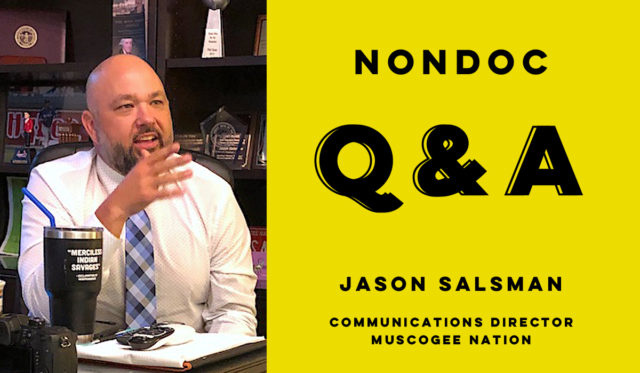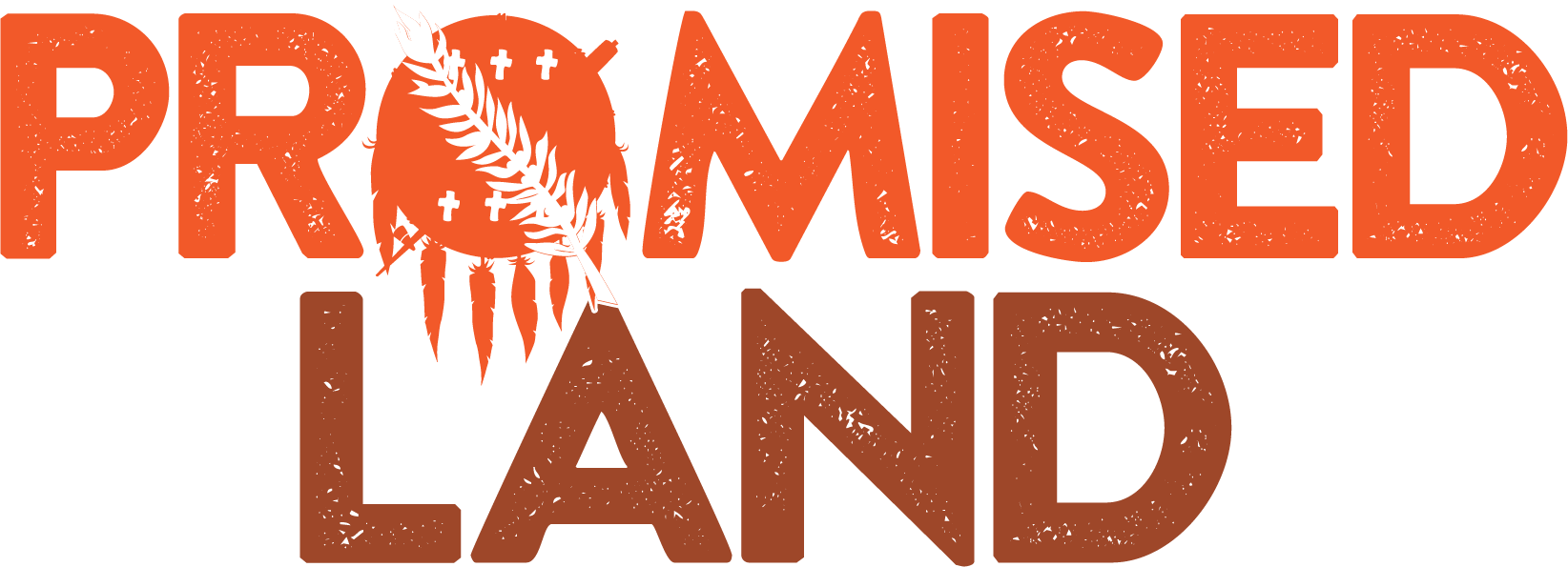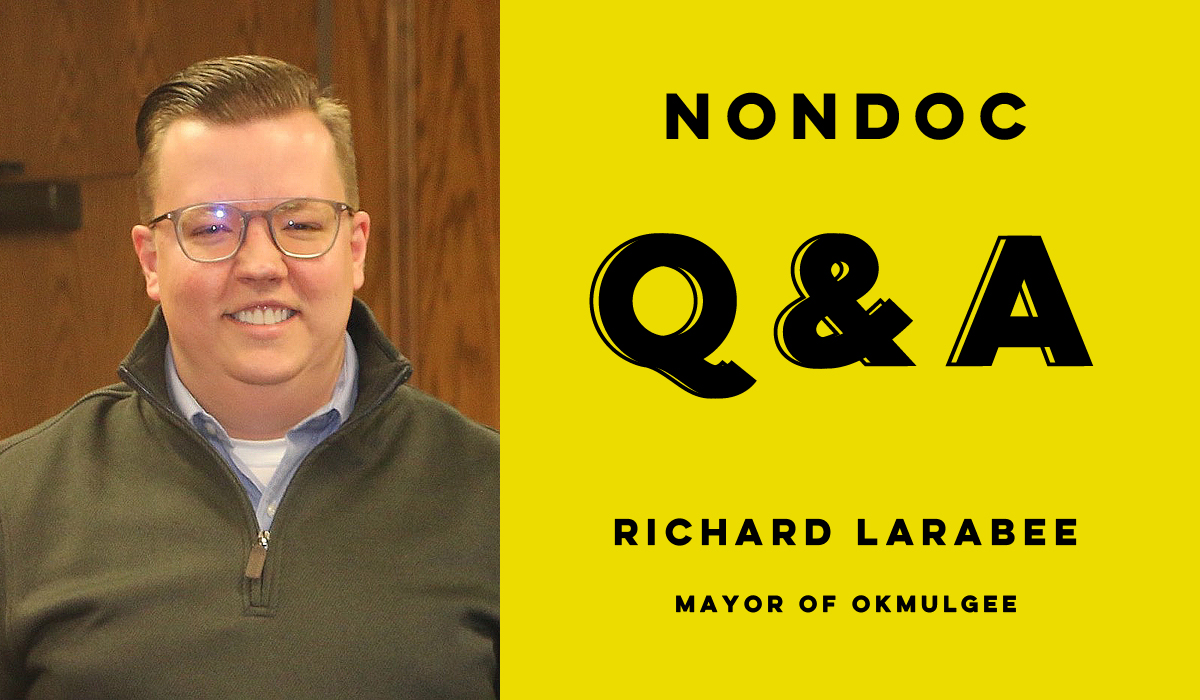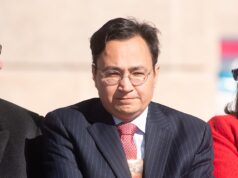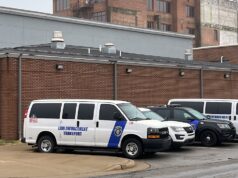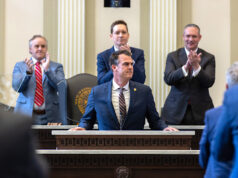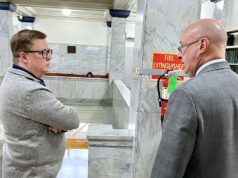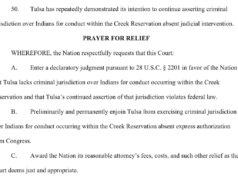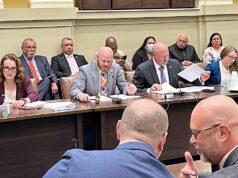MVSKOKE NATION / OKMULGEE — We sat down with Muscogee Nation director of communications Jason Salsman on Tuesday, July 27, and conducted an extensive interview. The conversation transcribed below represents more than 25 minutes of discussion and is presented in its entirety to provide thorough perspective on a range of issues affecting Muscogee Nation citizens and Oklahoma residents.
NonDoc participates in the Oklahoma Media Center’s Promised Land effort, which examines how the landmark McGirt v. Oklahoma decision affects both tribal and non-Indigenous residents in the state.
Two weeks prior, Oklahoma Gov. Kevin Stitt’s “McGirt v. Oklahoma community impact forum” had ended early in Tulsa after some Indigenous audience members brashly criticized Stitt and the assembled state district attorneys for not having tribal representatives on the stage.
That forum and other topics related to the July 2020 U.S. Supreme Court decision in McGirt v. Oklahoma — which affirmed the Muscogee Nation as an Indian Country reservation — are the focus of the conversation. Among other things, Salsman answers questions about cross-deputization agreements between local and tribal law enforcement agencies, Muscogee democracy and the Muscogee Freedmen.
The conversation with Jason Salsman, 39, has been edited lightly for clarity and style. It has been published on the same day as a separate Q&A with Okmulgee Mayor Richard Larabee, in which he also answers questions about the cross-deputization issue.
Tres Savage: You have made a diction distinction: “fix” versus “implement” when it comes to the McGirt v. Oklahoma decision. A lot of the rhetoric is about “fixing” — we’ve got to do this or that. You’re talking about implementation. Can you elaborate on what that means?
Jason Salsman: I think when we look from a year past [the ruling], you’ve had one side, or one body, one section of thinking that has said, “Let’s put all of our energy into doing what we have to do to affirm what the court has said.” You have the U.S. Attorney’s Offices doing that, you’ve got tribes doing that, you’ve got tribal prosecutorial officers doing that, court systems — all of us doing that. Finding money any way we can, grants, everything like that. Putting all of our energy into the future and looking forward, and what we have to do to make this work.
And then you have another side that has put all of their energy into fear mongering and media, sky-is-falling narratives of “the hearts and minds” of Oklahoma have to be turned against this decision. That this is an evil decision. It’s a decision that takes away Oklahoma as we know it. Everything you’ve ever known is gone. Which to me is hard, because when you put out that narrative asking people to jump on that bandwagon, you’re completely looking past and silencing tribal voices that, for 114 years, have been saying this is not the way it’s supposed to be. This is illegal. So it’s hard for me when you hear another side say, “Look, this is a raw deal, Oklahoma. It’s terrible. Why can’t we just do things the way they’ve always been done?” Because they’re illegal.
So when I say one half is proactively working for implementation and one half is putting all energy into not only not helping, which is what we should be doing and what we’ve asked for from the get go is just, let’s work together, let’s collaborate, let’s be government-to-government and work this out — and there’s ways we can do that. Instead of that, we have a side saying, “Not only do we not want to work with you and help you, we want this thing repealed. We want to put lawsuits against the presidency and get to the Department of the Interior.” Oklahoma is taking on the world to get this taken away from what was affirmed, I mean, get this taken away from what was won. And so, for me, it’s a lot of wasted energy on that side. This is a whole year where we could have been working together. We’ve had two meetings with [Oklahoma Gov. Kevin Stitt].
Savage: How did those go?
Salsman: Well, you know, we certainly want to be diplomatic. We’re never going to be the social media crowd that says disparaging things about elected officials and things like that. That gets a little bit much. And we were disappointed that the forum in Tulsa turned out the way it did. Because there’s got to be a level of respect, there’s got to be a disparity. Now having said that, do we understand the frustration of the voices of the voiceless and the people that have been marginalized for years? Do we understand that frustration? Absolutely. As a tribe and a government and the executive team, though, we certainly believe in diplomacy, and we want diplomacy, and we have reached out for that.
In the meetings, it certainly has been cordial, but I think what we see is just a base-level disconnect of what we’re trying to convey and what we’re trying to represent as far as what this means to us and undoing the 114 years of illegality to make way for opportunity that we’ve never seen, collaboration that we’ve never seen, public safety that we’ve never seen. Think about all of us pulling our resources together for the first time and being able to provide more. You know, we have 62 cross-deputization agreements now. We had 30 last July. We’ve been hooked up to try to make this thing work. We have.
Savage: Now let’s talk about the implementation and some of the challenges, because it’s not done like this overnight. You mentioned cross-deputization, and — if I’m not mistaken — discussions are still ongoing with Okmulgee police and (police) in Henryetta. What do you say to folks who, tribal or not, live in this town and say, “OK, it’s been a year. I see news stories about cross-deputization agreements. You’ve got them in 62 places, but we can’t figure out how to get one here in Okmulgee?”
Salsman: I think, on any agreement, both parties are going to look to what it does for them. Does it get us to a place where we can compromise and still not be left vulnerable, and we can compromise and move forward and everybody’s good? Or does one side think, “You know what, that doesn’t work for me.” And then the other side says, “You know, I need something done here or there.”
For whatever reason — I’ll just say this, and this is about as frank as I can be without being disrespectful to those agencies that you mentioned. But for whatever reason, they have problems that — what did I say, 62 other agencies, including Tulsa County sheriff, Glenpool Police Department, Oklahoma Highway Patrol, Federal Bureau of Investigation — these two agencies here close to home have something they can’t get over that all of those other ones are fine with.
Savage: Generally speaking, what’s the something?
Salsman: You’d have to ask them. Have you talked with them?
Savage: No, we’ll get on that. We just learned about this issue. We learned there aren’t cross-deputization agreements with those entities two hours ago.
Salsman: Yeah. And I feel like — what’s the old saying — you keep your friends close and your enemies closer? I think this is one of those things where we’ve been close for so long and have worked together so long, there may be long-standing bad blood between the departments. Maybe six years ago, Lighthorse didn’t come. Or maybe Okmulgee didn’t come and Lighthorse popped off and said something. Or maybe Okmulgee said Lighthorse isn’t pulling their weight. And we all know, in the law enforcement world, we can have egos. I’m not saying that inflammatorily. I’m saying it comes with the job.
Savage: Humans.
Salsman: You’ve got to walk and talk with the nightstick. And so I think that it’s human nature, exactly. In that field you can be a little bit, you know, king of the castle. And I think that’s probably a little bit what’s going on. That’s just me speculating, but I think that you wouldn’t be naive to think that some of that’s happening, maybe, some long simmering feuds, what have you.
But it’s weird because leadership has turned over here. We’ve got a Lighthorse chief that’s willing to close that gap with them. But I will tell you we’ve had instances that have been unfortunate. I had to send the Okmulgee Mayor (Richard Larabee) a screengrab from some of the police in Okmulgee posting on Facebook, like, “Haha, just sent a bullshit case to Lighthorse, plenty of more of those coming.” Like right after the [court decision]. I sent it to the mayor, and I was like, “Hey, mayor, we’re not trying to take over the world, but this doesn’t help.”
Savage: Let’s talk about this from the court standpoint. The (Okmulgee County) District Attorney Carol Iski, her tone at the forum up in Tulsa was markedly different than the governor’s. And I’m guessing her tone was fairly well appreciated. At the same time, you know there are some issues with the statute of limitations on retrying some cases and some limits on punishment and things like that in the federal system.
Salsman: Those are things we want to get fixed, by the way.
Savage: So that’s a fix versus an implementation?
Salsman: Yeah, that’s fix versus implement. That’s fine, because we’ve been hamstrung by that for years. Why? We should be allowed to prosecute crimes past three years.
Savage: How does that get fixed? Is that federal law?
Salsman: Yes.
Savage: So, why does Congressman (Tom) Cole’s bill not address that?
Salsman: I think Congressman Cole’s bill — all respect to Congressman Cole, he’s been a champion for Indian Country — but I think Congressman Cole’s bill has some ulterior motives that not everybody understands. Particularly when it pertains to very large tribes having interests with smaller tribes that are next to them, that they may want to circumvent for their own interests. That’s about as much as I’ll say on that. Look up the Delaware and [United Keetoowah Band of Cherokee Indians].
Joe Tomlinson: Something that Tres had sent me yesterday, actually, was the Sovereignty Symposium (on Oct. 11-12). I didn’t know about it. Talking about diplomacy — just having state officials, tribal leadership, several district attorneys, tribal attorney generals, that sort of thing. This seems like an attempt at diplomacy.
Salsman: It’s an attempt to reverse everything that that circus was recently (in Tulsa). Not reverse it — show a better way. The reason that failed is because the pretenses and everything that it was built upon is failure. It was not collaboration. It was exclusion. It was disrespect. It was not the proper channels. I don’t care what anybody says, you want to get tribal leadership somewhere? You don’t send a throwaway email to an attorney general, I promise you. Especially not during McGirt, when they’ve got a caseload that’s tripled from what they had before.
Chief (David) Hill talks with Sen. (James) Lankford on the phone every week. They got personal — they know each other. Chief can talk to Gov. Stitt on the phone if he wants to. But those type of things, as far as like, “Oh, you should have got the email from your attorney general.” There’s a proper way to do things and protocol, and there’s a proper way to do things whenever you want to invite leadership of a fellow sovereign. That’s another thing we’ve got to get to, is that you’re not asking the head of the PTA to come to this with you. You’re asking somebody that is equal to you. Hell, the head of a nation. You’re just the head of the state, you know what I mean? And so, equal footing needs to be given equal respect and everything like that. And I think Chief Hill — and I know for sure, because I’m under the wing — Chief Hill is a man that isn’t going to let you burn a bridge. He’s going to be the one to say, “No, I know how you’re acting. I know how our citizens are reacting to you, but you and I are going to sit down, and we’re going to do this a different way. And at the end of the day if I’ve done that” — he’s one of these guys — “if I’ve done my part, if I’ve done everything I can, and you still can’t be convinced, or you still can’t listen? It is what it is. I can sleep at night. I hope that you can, and we’ll see where it goes.” But we’re going to keep doing what we’re going to keep doing, and that includes continuing to pursue fruitful collaboration and fruitful conversation with those that would see this reversed, when all we want to do is see it blossom into the future.
RELATED
Okmulgee Mayor Richard Larabee emphasizes cooperation with Muscogee Nation by Tres Savage
When we talk about McGirt, we don’t talk about chaos. We talk about incredible opportunity to build like we’ve never had before. That is every opportunity that’s out there, as Tres said, that we don’t even know what could be yet. It could be things that would lead to prosperity for this area. Look around you, we’ve got a lot of poverty. We’ve got a lot of things that are from years and years and years of not having any opportunity. People move in here and out. You know, the oil dried up in this town and these areas and everything like that. It’s left a lot of poverty and a lot of places where you’re going to need something to come in and not only make things right, but structurally get it to where you can progress and have a future. And that’s why we see it that way.
Right now, we are concerned with the public safety aspect of it. Who wouldn’t be? We’ve got people that are transferring cases, and we’re having cases looked back upon and, as you said, things that are out of our control, statute of limitations. I sure wish the state wouldn’t have backlogged a lot of rape kits, and so that pushes things to where we do run out a statute of limitations. And then they have a red herring there to go, “Hey, look everybody, you know, statute of limitations, what are we gonna do on this McGirt (issue)?” You know, I sympathize with that, and I hate that that may be the case, but it certainly wasn’t our fault. So there’s reasons for that. There’s reasons we need to change tribal sentencing, the Tribal Law and Order Act, all of that stuff. There’s just a lot of work to do, and it is so counterproductive to me to not dive in and get to work, rather than dive in and see if we can do a smear campaign. Especially when you say that you’re the governor of Oklahoma. You’re governor for all Oklahomans. A lot of those Oklahomans are Indians. A lot of them feel disrespected by the rhetoric, hurt by the fact that it only matters that Oklahoma shouldn’t have to change the way it’s always been, rather than, “Oh, it’s fine that you never got to be what you could have always been.” We don’t even talk about 114 years of, maybe, back-pay.
Savage: The thing that stood out to us, and Mr. (John) Beaver emphasized with the tour of the (Muscogee Nation) Council House, was the history before 114 years ago. People don’t talk about it. I mean, I was fortunate enough, growing up as I did, having a baseline understanding of Indian removal, and how Oklahoma came to be, right? But that doesn’t mean I had an understanding of 1867 to 1907 [Muscogee Nation], right? And so, if you think about that, it sort of sets the stage for the vision, the ultimate vision of — as you said — Chief Hill’s forefathers. What they were fighting for and trying to accomplish. It didn’t start 114 years ago. It started way before that.
Salsman: It started since we were contacted, to be honest. I mean, I think right then and there — it was — we didn’t know it at the time, but it was like, you know, we’ll always be fighting just to be. Just to exist. And that fight to just exist is literally engrained in our people’s DNA. And that’s why you see the outburst the other night. Of course we didn’t want to see that happen. But, I understand it. If I didn’t understand it, I wouldn’t be Creek. I would be somebody that couldn’t understand us. I think that there’s a lot of people that aren’t even Indian, too, that see things the way we do. Because, I fully believe that, even though we have these, you know, antiquated [Bureau of Indian Affairs] and blood quantum shit and all that stuff. I fully believe that — sorry, I know that’s on record, sorry.
Savage: Well, the Tres Savage No. 1 Rule of Journalism is that if a source cusses, you put it in a quote. But the BIA and all that stuff ….
Salsman: I think, if you live amongst and work amongst and speak like and get the customs and everything — sort of the Dances With Wolves method, really — then you’re tribal. You understand those communities. I think that’s what’s happened to a lot of Oklahomans. They understand tribes. I don’t think the governor’s ever really taken the time to get to know tribal people and tribal governments and everything like that. It was something that he could maybe check on the beginning of a SAT or something like that, that he was American Indian or something like that. But as far as the human condition, there’s no understanding of it whatsoever.
Follow @NonDocMedia on:
Savage: Final thing. You’ve got an election coming up.
Salsman: Primary is [on Sept. 18], then November is the [general] election. Would love to have you guys covering it.
Savage: We’ll be covering it.
Tomlinson: We will definitely be doing that.
Salsman: We will have an exciting one, that’s for sure.
Savage: Yeah, so I think that’s the issue as well. It puts extra focus and responsibility on governments. And no government, be it, federal, state, municipal, county or tribal or whatever, is, you know — that’s the fun of democracy: It’s not always simple, and it can be a little messy. It’s the worst form of government except for all the others, right? Well actually, that might be a little offensive, but it’s the famous quote. So, what should people who are tribal citizens or people who live within the Muscogee reservation boundaries and who aren’t tribal citizens and aren’t voting, what should they be watching for in the next six months? Both from an electoral standpoint and from a policy standpoint?
Salsman: Well, I think a lot of the times, in tribal elections, it’s the big attention grabbers: “We need to improve our health. We need to improve education.”
Savage: Programs.
Salsman: “We don’t have enough — We don’t have enough housing. We don’t have enough this, enough that.” And I think that we’re slowly turning into a voting base — although our voting members need to improve, and I believe that they will and can. I think we’re starting to turn into a more informed — oh, what’s the word I want to say here — not critical, but…
Savage: Policy-driven? Thoughtful?
Salsman: People are wanting to see fewer buzzwords and more actual strategic planning behind how you plan to do that. Now, we do have people that would like to see no blood quantum restrictions on running for office, because that does sort of swallow up our pool, a little bit, to where there’s only a certain amount that can run, and everything like that. We certainly have the majority of our citizenry that doesn’t meet the blood quantum requirement. You’ve got to be a quarter to run for anything at the nation.
Savage: What about to vote? Just enrolled?
Salsman: Just enrolled, yes. So, I think our election base is — they’re wanting to get some more steak with the sizzle. For the longest time, it was easy to go to the forum and say, “I want to get elders houses.” And I think now at the forum, somebody’s standing up going, “How? What do you mean?” When before it was just like, “Oh, elders — houses.” Or, “I knew his daddy, so I’m going to vote for him.” You know what I mean? And that leads to candidates (being) a little bit more savvy on that. You see better materials and more informative literature that comes out from each candidate, candidates getting on social media and going back and forth with people and really kind of jumping into the voter base a little bit more. So I think it’s helped all of our process to be like that, and it’s great. We’ve done some initiatives and things like that: Native Vote, having candidate forums, having everything we can possibly think of. We ought to have you guys come and do moderation at one of those candidate forums, that would be really cool.
Savage: We would love it. That would be really cool.
Salsman: We had (OU College of Law professor) Lindsay Robertson do one the last time we did it, and he was great. It was perfect.
Savage: We would love to do that. One thing I thought about — Joe’s doing a story, so while we’ve got you — I don’t claim to know all of the details, but the Muscogee Freedmen question has been one that has sort of lingered. Joe is working on a story kind of about not just this nation, but that question in the following of the Supreme Court decision. What’s the latest on that? It seems like another area where there has been some — I’ve seen things written by people on social media — and I think, “Well, that ain’t going to help move it forward,” right?
Salsman: It’s very polarizing.
Savage: Yeah. So where’s the solution there?
Salsman: So this has been a question and issue amongst our government and citizenry for years, and I think really there has always been sort of a “kick the can” approach, and kind of, “That can be somebody else’s problem, that can be somebody else’s issue.” And what this administration has done was say, “Look, this is not an issue for a chief to decide (or) for a National Council to decide. This is a constitutional issue that requires the citizens to speak up and let us know how they want to be established as a citizen of this nation.” Is it from blood lineage? Is it from what a treaty says? Is it from who we say is Creek and the very heart of self-determination and sovereignty? These very big values that we hold so dear come in contrast with some that feel disenfranchised. I think a lot of that disenfranchisement comes from outside, right? It’s not between the Muscogees and the Freedmen. There are outside factors.
When I say outside factors, I say the U.S. government going, “Well, we’re at the end of the Civil War, we’ve got to do something with these Freedmen. Make them citizens of this tribe down there. That way we don’t have to have any say over them,” or whatever. Now I think, to me, when you look at it and you get to the core of the issue, that’s what Chief Hill did. He said, “Let’s just take this to the people and ask the people.” And, you know, he got a lot of flack for that. He got a lot of flack for simply saying, “I think it’s up to the people,” because the headlines — again, we got burned. When the headlines came out, you guys read them, I’m sure: “The Creek Nation is considering changing its stance on Freedman.” We never said that, ever. But chief certainly has his thoughts on issues that pertain to the nation that a lot of people fall on both sides of. This is one of those issues. And I had to talk with chief, and I said, “Chief” — because he felt conflicted — because there are many people that think, “It’s Indian by blood,” and there are many people that go, “We’re doing the Freedmen wrong. What are you doing? Do right by these Freedmen.” I said, “Chief, you represent this one just as much as you do this one.” And so, our policy and our stance has to be, “We’re giving it to you because you guys [must] decide.” It’s almost like this Pontius Pilate moment, where it’s like, “Hey, it’s the people’s decision,” and that’s what chief has said. He’s wanted to start a string of town halls and everything. We’ll probably have to wait until all this election stuff blows over because we’re going to be having them anyway. Plus, we’ve got this blow up of COVID variant that we don’t want to start having a bunch of people packed in screaming at each other.
Savage: So you think it could be something that, in 2022, there becomes some question on whether that ends up on a ballot, or something like that?
Salsman: Possibly. Yeah, and I think that’s what the chief’s calling for. Is there enough people that want to see this? Here’s the beauty of our constitution. It is what it is, and it says what it says right now, but it also has an avenue to change, and that lies with the people. A citizen-led petition with two-thirds of the last election count, forwards to the National Council…
Savage: Two-thirds of the last election turnout?
Salsman: Voting turnout.
Savage: OK, two-thirds sign.
Salsman: Yes, then it goes to a ballot. Then the citizens vote on it.
Savage: They vote on it. They’ve got to pass it by two-thirds?
Salsman: Yes, (then it is a) constitutional amendment.
Savage: Okay, so that could be something (down the road).
Salsman: So our thing is, the constitution says what it says right now. It has avenues to change itself, and those avenues lie with the people. And that’s what chief said.
Savage: Anything else you want to add that we didn’t get to ask you?
Salsman: No, I appreciate you guys. This is what real journalism is. It’s getting into the community and understanding everything you’re covering. It’s not just forming your own opinions and then going on and writing and not knowing anything about it.








